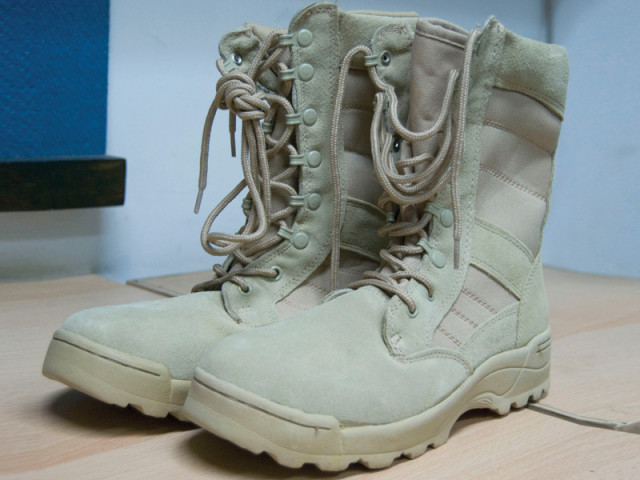Night vision goggles, anyone? We just got them from a NATO container
The activity seemingly went unnoticed by NATO officials for years.

When strolling through a flea market in Karachi, one would not expect to come across new uniforms intended for North Atlantic Treaty Organisation (Nato) forces in Afghanistan. However, Mohammad Siddique, a shopkeeper in Jackson Bazaar, Kemari, claims not only to have such uniforms, but also new accessories like boots, socks, and knives in his possession.
Worried that the goods may be counterfeits? Siddique provides a “money back guarantee” to his customers in case they are not satisfied.
“US commando boots, safety shoes, army uniforms, glasses, knives, torches, tools, socks, beds and even night vision goggles are sold in Chaman and Peshawar,” says Siddique. Night vision goggles, especially, are considered a rarity for much of the Pakistani armed forces.
However, Siddique said that he does not display these items in his shop, as they are either stolen from Nato containers in Pakistan, or brought in from Afghanistan through the Chaman and Torkham borders.
Siddique said that he buys these goods at the Chaman border and the Karkhano Market in Peshawar, and brings them here in a goods container. He avoids keeping the items at the store because of fear of police and other security agencies. “I only bring them to the shop when someone demands them.”
“When the [Nato] supply was not blocked by Pakistan, dozens of containers used to be looted on their way to Afghanistan every week,” said Mohammad Islam, a transporter of Nato goods.
On the other hand, transport companies seem to suffer most from such activities, as they have to pay the cost of stolen goods to Nato in case someone notices the discrepancy.
Islam says that Balochistan is the most dangerous path in the Nato supply route.
Most of the containers are targeted as they are on their way back to the port from Afghanistan, as they contain both used and new goods. “They do not try and open these containers in Karachi,” says Islam.
A Nato truck driver based at the Mauripur truck stand in Karachi, Naeem Bacha, said that drivers often have links with criminal gangs, who attack containers and then give drivers a cut of the loot. “Without the consent of the driver or the owner of the vehicle, no one can even touch these containers,” said Bacha.
The next stage involves the criminals taking great pains to ensure that no one is able to trace the stolen back to them. Expert forgers, who are paid around Rs.20,000, are responsible for breaking the seals of the container and then resealing them later. After the container has been ransacked, it is filled with rocks, sand and cement to bring its weight back to the original level.
Bacha says that the police station of the area is contacted in advance and given the location where the container will be intercepted. “Police then provides cover for the whole operation.”
However, not all incidents go as smoothly. Major, another Nato transporter, recalled the ransacking of a German container, which was loaded with drinks, in Peshawar. “Police arrested its driver and recovered some of the cargo from him. I had to pay Nato Rs12 million for the missing goods.”
However, Major admits that the practice has turned truck drivers and transporters into millionaires in a short span of time, as nearly 95 percent of Nato containers passing to Afghanistan are broken into before they reach their destination. “Nato officials only started noticing this during the last three years, and have now started checking the containers.” Looks like Nato has finally caught up with the realities of doing business in Pakistan.
Published in The Express Tribune, April 5th, 2012.




1724319076-0/Untitled-design-(5)1724319076-0-208x130.webp)














COMMENTS
Comments are moderated and generally will be posted if they are on-topic and not abusive.
For more information, please see our Comments FAQ